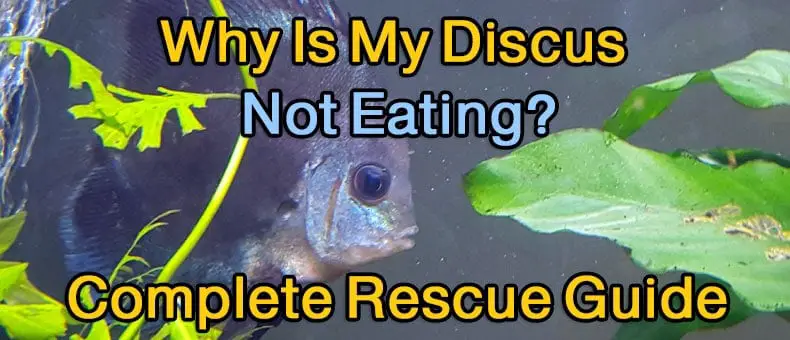
Why is my Discus fish is not eating? A discus fish may lose its appetite due to stress, and unhealthy water parameters, when introduced to a new aquarium, or Bacterial infection, etc. Discus fish also could stop eating due to prior mishandling, illness, or being bullied by other Discus fish can cause your Discus to stop eating.
Table of Contents
- Why Won’t My New Discus Eat? [VIDEO]
- How Long Can A Discus Fish Go Without Eating?
- Reasons Why My Discus Is Not Eating
- Symptoms
- Disease Details and Causes
- Tuberculosis
- Fin and Tail Rot
- Dropsy
- Hexamita
- Conclusion
Why Won’t My New Discus Eat? [VIDEO]
How Long Can A Discus Fish Go Without Eating?
A discus fish longer than 4inch (10cm) can last up to two weeks without eating, older ones can last up to a month without food. A discus fish has a unique adaptive feature that allows it to last for a long time without food.
This starvation may occur naturally and has positive effects on the health of the discus fish. When the discus fish is not eating, it may be less reactive in order to conserve energy.
You need to first discover why your discus fish has stopped eating due to losing her appetite as you know, there are several reasons the discus is not eating and hiding.
Reasons Why My Discus Is Not Eating
You might be wondering what to do is discuss is not eating or how do you get your discus to eat, then you should know that mainly the reasons divided into two main categories you have to check them out and decide which one matches your discus case to know how to make her eat accordingly:
- Normal Behavior
- Illness Symptoms
Normal Behavior
There are 6 reasons considered as normal behavior when a Discus is not eating which might be:
(1) A new discus added to the aquarium
When a new discus is presented to a new aquarium, she might hide alone, not social, and not eating for several days, and this is normal due to the fact she is new to the environment, and she will get used to it eventually within 2 to 5 days.
(2) Discus size compared to another discus
If the Discus having the issue is relevantly smaller in size compared to the rest of the discus fishes in the tank, she will not be able to catch up with the bigger sized ones, and most probably she will be bullied by one or more of them.
(3) A Discus is alone in a community aquarium
If you have one Discus in your tank with other types of compatible fishes, then this is 90% the reason why she is not eating, Discus are very sensitive fishes and need to be gathered with its kind for at least 5 to 6 fishes of close in size in one tank; otherwise, she will feel lonely, scared and stress thus she will not eat.
(4) Water Parameters are not healthy
If the water parameter is not healthy, she will be calm in the corner of the tank or might be swimming on the top of the water near the water surface.
(5) Water Temperature is low
As I stated, Discus is very a sensitive fish and lives in a relevant warm water environment, so check your water temp if it is below 28c, then this might be the reason behind your Discus is stressed and not eating.
(6) Lack of Oxygen in the water
You can easily identify whether you have a lack of oxygen in the tank when you see your Discus remains in the top of your tank, breathing near the surface, and doesn’t go down to eat, then you should know you need to add more air bubbles.
If you have plants in the aquarium, then most probably you have a Co2 cylinder that adds Co2 to the water; this will reduce the oxygen ratio in the water, and definitely, you need to provide oxygen air pumps.
Illness Symptoms
Symptoms
You have to of necessity be sure to pay attention to your discus when you see the following signals:
- Loss of appetite.
- White pooping.
- Hole in the head.
- Thining out although they’re eating well.
- White spot infection/Ich.
- Bloating.
- Fin rot.
- Skin sores.
- Jerky Swimming.
- Staying in the corner of the tank.
The above are symptoms of Diseases that a Discus fishes could have, and such symptoms are signs of imminent disease, of which some types are treated below:
Disease Details and Causes
Tuberculosis
This is a mycobacterium that is found everywhere, including in food remnants, debris, or bottom gravel.
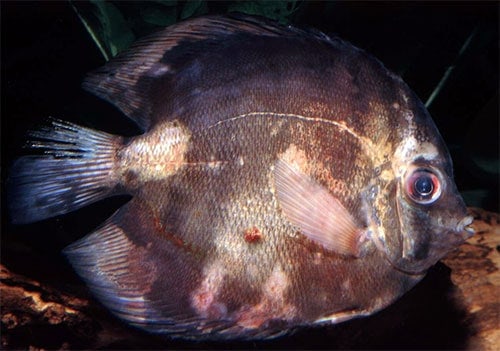
The symptoms of the tuberculosis disease may include:
- Emaciation.
- Loss of appetite.
- Open skin sores.
- Bloating.
- Staying in the corner of the tank.
Tuberculosis occurs when your discus is:
- Weak.
- Crowded
- In a poor living environment.
Tuberculosis can be transmitted from one fish to another through skin or gills. If not realized early, it can lead to the death of your Fish. The water in your aquarium should always be clean and free of food crumbs or dirt, which can cause bacteria to infest. When it gets to the stage of skin sore, which appears as if chunks turn out with bleeding at the edges, it is critical already, and it is very rare to successfully treat the discus back to full recovery.
Tuberculosis Treatment
[STEP 1] – Quarantine the Fish to a smaller tank filled with properly tested water to avoid it contaminating other fishes and to enable you to treat it effectively.
The most effective treatment to administer to your Fish is Kanamycin + Vitamin B-6 for 30 days.
[STEP 2] – Add one drop of this vitamin to every 5 gallons of aquarium water.
Future Prevention Tips
It is difficult for you to know if your discus is ill except you see visible symptoms, mycobacteria can be in the body of your discus for some time before the symptoms begin to fully manifest, so preventive measures are very necessary.
- Boost the immune system of your fish by feeding them properly and keep them healthy and happy in a good tank condition; by this, you limit their exposure to mycobacteria.
- Fishes who are weak and wounded should be isolated in a quarantine tank and treated there till they are healthy.
- New Fishes should be quarantined before joining the main aquarium.
- Plants and all equipment should always be sterilized before and after use.
Fin and Tail Rot
It is caused by pathogens, which include- Flexi bacter columnaris, Norcadia, mycobacterium, etc.
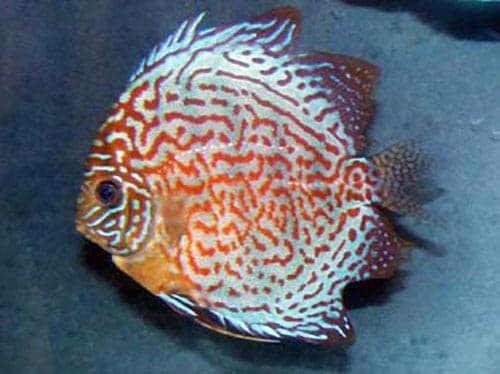
It’s symptoms includes:
- White coloration at the edge of the Discus fish.
- The fins appearing ragged and split.
- Inflaming of the base of the fins.
- Rotting away from a part of the fin.
When the Fin or tail of your Fish begins to rot, that means that your aquarium is bacteria concentrated. This disease often simultaneously occurs with other diseases and difficult to cure when it is in a more advanced stage.
The cause of the fin and tail rot disease could be:
- When a discus fish is bitten by another, the open part can be infested by a bacteria which if not taken care of, can eat your Discus to death.
- Poor water conditions in the aquarium.
- Stress resulting from moving the discus too often.
- Overcrowded aquarium.
- When the discus is living with more aggressive fishes.
Fin and Tail Rot Treatments
[STEP 1] – Quickly quarantine the Fish with the symptoms in a separate mini tank that is filled with properly tested water.
[STEP 2] – Treat the water condition in the main tank immediately to remove toxins and ensure other Discus are not infected.
[STEP 3] – Clear activated Carbon from the aquarium filter because it will remove drugs from the water
Future Prevention
- Always keep good water quality.
- Maintain properly balanced feeding for Discus fishes.
- Maintain proper water level.
Dropsy
This is a bacterial infection that causes the body of the discus to swell and eyes to pop out.
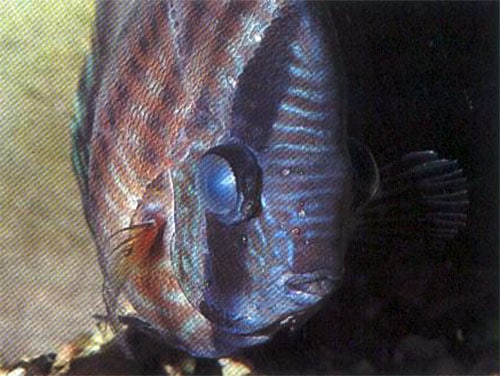
Dropsy disease symptoms include:
- Loss of appetite.
- Swelling of the Fish’s stomach and most times the whole body.
- Bulgy eyes.
- Behavioral changes.
This is easily detected because of the swollen belly of the discus, it is not contagious but can have dangerous effects on other fishes in the aquarium if not quickly taken care of.
Dropsy is caused by stress due to overcrowding and mostly affects fishes with poor kidneys.
Dropsy Treatment
[STEP 1] – Isolate the sick discus to a quarantine tank, to enable you to change the water easily.
[STEP 2] – Create a salt bath by adding a maximum of 1 to 2 tablespoons of Epsom salt to every 10 gallons of water in the quarantine tank; the magnesium sulfate will help reduce the water in the body of the discus fish that caused it to swell.
[STEP 3] – Feed your infected discus fish with anti-bacterial fish food containing antibiotics like chloromycetin and tetracycline either you purchase, or you make it at home.
[STEP 4] – Lower the water pH to the range of 6.0 this will prevent the ammonia from being toxic in case your filter is infected thus, it will reduce the stresses in your sick discus.
[STEP 5] – If your discus starts eating, add Discomed medicine to your discus food.
[STEP 6] – Observe the infected discus for 7-10 days if there’s no improvement then treat with Maracyn 2 incase if the infection is from the skin of the discus.
Future Prevention
- One of the most effective ways to prevent dropsy disease is to maintain proper water quality, staying on top of the routine by changing 25% -30% of the water volume weekly.
Hexamita
The disease called Hexamita and it’s basically a bacterial infection that attacks the discus internal organs.
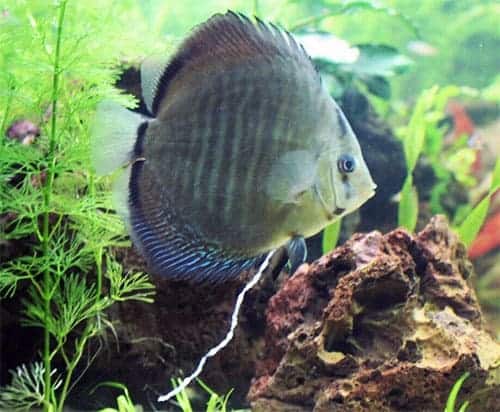
Hexamita disease symptoms:
- Loss of appetite.
- White pooping.
- Hole in the head.
Hexamita could be transferred to your discus in different ways:
- Infection from a newly introduced discus fish having the Hexamita bacteria.
- Might show up on the Discus fish due to continuous stress.
- By infecting fish food.
Hexamita Treatment
Follow the full detailed Hexamita treatment from my other article which covers everything related to Hexamita link to Discus Hexamita Disease – Metronidazole Complete Cure Guide.
Future Prevention
- Do not put a newly purchased discus or other fish in your main tank.
- Before presenting the new fish to your tank.
- Keep an eye on your water parameters.
- Do a weekly 25 – 30% water change.
- Always put an air pump in your Discus aquarium.
- Do not feed your discus frozen worms.
- Do not feed your discus flakes.
- Clean your filter.
Conclusion
In taking care of the discus fish as an aquarist, you need to be properly educated on the entire behavior of the discus so that you will be able to detect when something has gone wrong in your aquarium. Proper water quality is always paramount and quick attention to the discus will always be more effective.
The discus fish is fragile and needs a lot of care. If there are no improvements in treating any of the diseases, you should quickly visit a pet doctor.


Hello
I need your help.
I have stendker discus the strange thing is that I have group of 8 fishes 5 of them 8 CM and 3 are 11 CM
All of them are in good health and swim normal etc. But the 3 which are 11 CM at the time of feeding they hide and refuse to eat.
Other smaller fishes eat well.
The temp I raised it to 33 C
Water parameters is ok.
Thanks
Nasir
Hi Nasir, normally this is a reaction to being bullied by the bigger Discus fishes, at the feeding time, Discus fish they react just like they do in nature at the time of feeding, the bullying ones will start fighting other fishes of similar size or even a little smaller ones, but if you have very small ones they will not consider them as versus to them especially when they are from a different species. as a solution, you could spread the food across the tank so everyone should have a chance to eat.
You may check the recent article I wrote for you guys to have a healthy Discus.
https://discusrescue.com/5-main-tips-on-how-to-keep-healthy-discus-practical-guide/
i think i have gill flucks in my tank wiil paragared workand can i also meto at the same time
Hi Allen, you could check the dedicated article for Gill fluke disease treatment.
https://discusrescue.com/how-do-you-treat-gill-flukes-in-discus-gill-fluke-treatment/
Hello sir, I have 6 discus fish in my tank and suddenly all have stopped eating, they are normal in behavior, when I bought them I fed them tetra bits but they didn’t eat, then I fed them worms, they ate them a lot, now they dont eat worms also with that excitement, kindly advice, also whichever fish I keep in my tank, then they get a slightly blackish coat, what should be the reasons??
Hi Dipika,
I don’t know your water parameters, tanks size, the accessories or peripherals you are using in your tank, what type of other fishes are in your tank along with your discus ..etc, however, from what you have said that your Discus became slightly darker this is a sign that your Discus fishes are under stress, and stress is caused by different factors you can learn more about it from my other article:
https://discusrescue.com/13-reasons-why-my-discus-fish-is-stressed-discus-stress-treatment/
mostly your water is in bad condition.
Hope this helps.
Hi,
I have 4 cobalt blue discus in my 50 gallon tank. tank parameter Ammonia -0 , Nitrite – 0 Nitrate 10-20 ppm. Here’s my tank video for reference.
The top discus (left most & top ) all of a sudden stopped eating for 2-3 days. HEalth wise u can refer to video i feel he’s doing good. He’s staying aloof from the group. They all had been raised from 3″ size and I never had this issue. Remaining discus r active and doing fine. I am not sure what to do…
Dont want to separate it now as it might be stressed and need some time.. raised tank temp to 31 C. Please let me know what best can b done.
Hi Pinki,
From the video, nothing wrong is shown in your Discus, but as per your statement if your Discus is stopped eating there are many reasons why a Discus might stop eating as shown in this article, however, Discus fish can withhold more than 3 days without eating, so better to keep an eye on her for the coming 2 to 3 days and see if she started eating, meanwhile, since there are no other symptoms you see on her in order to identify the reason behind her appetite loss, better you read my other article on how to keep Discus fish healthy (https://discusrescue.com/5-main-tips-on-how-to-keep-healthy-discus-practical-guide/) and see if you are doing something wrong that might lead to your Discus not eating.
Hi,
I just bought a wild discus 3 weeks ago but my discus did not eat till now. I have tried all types of food from pellets, flakes, blood worm, tubifex worm but it does not accept anything. It looks healthy though. It does not show any signs of sickness.
Your forum is very informative,my question is where can I find a heater that keeps my water@82°? Thanks Jason
Hi Jason,
Please check this article for information on where and what to buy.
regards
I had a pair of red blood pigeons the both stopped eating werent showing any symptoms of illness I pulled them from main tank treated with salt an metronidazole one didnt not make it when the other appetites was fully back I placed him back to main tank now my red orange is not eating and my cobalt is not eating also an hidding treated whole tank with paraguard an metronidazole for a week or longer now doing water changes daily an large ones Weekley everything been cleaned an water parameter are good what do I do I’m truly lost here.
Test your water parameters and water temperature, if everything seems normal, then you should remember that when Discus not eating that doesn’t necessarily relate to a certain disease or infection, but most of the times either the new Discus is not yet got used to her new place, or there is a source of stress that keeps them under stress.
check out my other article about all possible causes of Discus stress and how to prevent that.
13 Reasons Why My Discus Fish Is Stressed – Discus Stress Treatment
I have 6 discus currently in my 75 gallon tank along with some Glolite Tetras, a Mollie and a Dwarf Gourami along with 4 Corydora bottom-feeders. There are several live plants, decor and the substrate is sand. The tank was setup in January of this year however was for other fish at the time. Ive had 2 Discus in here after Quarantine for 2 weeks before adding 4 more which I also Quarentined. So, In total they have been in the tank for about 7 weeks now. I have a successful paring of 2 and they did spawn but ate the eggs after. They become pretty aggressive during this time. You can tell there was a pecking order established and one of my guys who wasn’t eating, eventually started to push through and now he eats all the time. I have 2 that haven’t been eating much at all. I’ll find them pecking at algae but when food is dropped in (always in multiple places) they both seem not interested. I’ve seen some food bullying take place and wondering if they are afraid to eat? I’m wondering what I should do? My white one who use to eat 3-4 times a day suddenly stopped. I feed them a mix of shrimp brine, frozen blood worms, Hans frozen beef heart mix. I have garlic guard too and they don’t seem to care.
Water parameters:
84 degrees
10ppm Nitrate
0 Nitrite
6.5 PH
0 Ammonia
I do a 35% water change every 3 days
Any thoughts or advice to get this fish to eat? They seem to hide and one of them picks on another fish who does eat. Just seems to be these 2 as the others will eat like they never had food before 😆
first of all, you can make water change once every week it’s easier for you as long as you have a big tank with few Discus.
Secondly, I advise not to feed them frozen blood worms cause many Discus are having health issues because of that but not always.
Check the best Discus food: 11 Best Food For Discus – What Is The Best Food For Discus?
Third thing, remove the Mollie from the tank as they might nip the Discus from time to time especially on feeding time, they are not so compatible with Discus.
for further details about Discus tank mates you can check this link:
11 Best Food For Discus – What Is The Best Food For Discus?
Apart from that, you may give your Discus some more time to feel more comfortable with each other, there are certain times where Discus tries to bully each other to dominate the tank.
Hi Sir
I have a pair got from a keeper after a month the female died with no apparent reason. The male also become slow, then I got another female and the male got happy and active. The famle after a week stopped eating, doing jerk swimming, hiding and even lay down some time.
The only alarming parameter is high ph 8.2 which I am bringing down.
I used sera flagell for 5 days and after a break I also used metroplex ots 6th day. The LFS is helpful they asked me to put Epsom salt with little PP and M.green.
The fish today started some swimming however not eating I also notice some small white particles like mucus in water which I am promptly removing
What is your kind advice
Can I share video?
The information you provided is not enough, however, there are several factors that could lead your Discus not to eat such as a fish introduced to a new environment, a stressed Discus fish, bad water quality… etc
each of the said reasons should be avoided in order to have healthy Discus fishes in your tank.
NOTE: Giving your Discus a lot of medicine for a long period of time will reduce the water quality and kill the beneficial bacteria that the fish need to be healthy. so always stick to the prevention for fewer health issues in your tank.
Thanks for your time Sir
The water parameters are all well except for PH which is 7.8 to 8
I am putting wardley p h down to adjust
The discus is still not eating and sometime swim on sides, however is moving with speed. Some time it is near surface.
I can add beneficial bacteria if required
Thanks
Still not eating.
Please tell me what information is required to be shared.
Hi Sammy,
If your Discus is swimming on its side, this is a different health issue, please check:
Why Do Discus Lay, Swim On Its Side? – Discus Leaning Cure
Also, remember what I advised you in my previous reply to take prevention for the future better than having continuous Discus health issues.
Note, remember two things to consider, consider having a good external canister filter (What Is The Best Filter For A Discus Tank? 7 Best Discus Filter), and also the food you are feeding to your Discus, for instance if you feed your Discus flakes, then this is not a good option cause when Discus eat the flakes from the water surface it will increase the chance of your Discus to have bloating issue just like what you are having now (11 Best Food For Discus – What Is The Best Food For Discus?)
Wish you luck with your Discus dear.
Hi
Wonderful article! I have 5 discus and one of 2 smaller ones is hiding and not eating for more than a month. I’ve seen him pick at algae on plastic plants only. It’s obviously due to aggression. The 2 largest discus are constantly facing off. I finally isolated the discus who is not eating 1 week ago. He’ll now come out of hiding but continues to refuse frozen blood worms and shrimp which he ate well when he first arrived. Is there anything else I can do?
I have a Discus fish that hopefully is recovering from cloudy eye. I have been using Primafix with daily water changes. Today being day 11 of treatment. My aquarium is a 600 litre tank with 6 large Discus. I test the water regularly seeing nothing untoward. However the fish with cloudy eye stays in the corner and does not eat. I have tried to feed by hand as the cloudy eye effects his sight but to no avail. Initially he had a white dot in the centre of the eye which is diminishing. Any help with this situation appreciated.
Hello,
I am looking for an advice how to solve a problem with loss of appetite of my discus fish.
I have 8 discuses. One of them, 4 year old female about 4’ diameter has a chronic problem which has been lasting for half a year, leading to gradually worsening symptoms.
It begun with gradual loss of weight. Then I realised that it has a kind of, let us call it bulb, on a left side behind the gills. It is the area in the middle of the corpus, so I thought it was a stomach problem. After some time I realised that this is not exactly a bulb but the fish is constantly slightly bend to the right side so it looks like it has a bulb on the left side. Beside of that it become darken a bit from time to time and fragile to infections. The last thing that I noticed is, I don’t know how to exacltly explain it, this one fish gives an impression of being much more older that other discus fishes, despite they are the same age.
Two months ago I used metronidasole because I noticed some other fish turning black and it was high time to give them a dose of once a year preventive anticrobial treatment.
Last week I cured fin rot. The infection is cured with no specific aftermath.
The fish is now in an average general condition. It is hiding with mean to decrease appetite and became once again darken.
Can you please help me understand the case of gradual loss of weight, side bending, and the impression of looking elderly?
Any help is appreciated.